- Home
- Patrick O'Brian
H.M.S. Surprise Page 22
H.M.S. Surprise Read online
Page 22
'Stephen,' she said, 'I cannot stay. Come and see me. I must tell you where I live. Do you know Malabar hill?'
'I know, I know,' said Stephen, meaning that he knew where she lived—knew her house well; but she paid no attention in the hurry of her thoughts and went on, 'No. You will certainly get lost.' She turned to Dil. 'Dost know the Jain temple beyond the Black Pagoda—the palace of Jaswant Rao and then the Satara tower—' a rapid, intricate series of directions. Dil's expression was reserved, slightly cynical, patronising, knowing; it was clear that only politeness kept her from cutting them short, from crying with Stephen, 'But I know, I know.' ' . . . then through the garden. He will certainly be lost without a wise hand to guide him; so bring him tomorrow night, I pray, and thou shalt have three wishes.'
'Certainly he needs guidance.'
The carriage door slammed, the syce heaved up the steps, from out of the rigidly-assumed discretion the three officers stole secret glances at the glacis: the barouche melted into the sea of moving forms; for a few moments the apricot umbrellas could still be seen, and then they were gone.
Stephen felt the weight of Dil's unwinking scrutiny: he scratched himself in silence and listened to the now violent pounding of his heart.
'Oh, oh, oh,' she cried at last, rising and placing her thin hands together like a temple-dancer. 'Oh, oh, I understand it now.' She writhed and stamped and swayed, chanting, 'Oh Krishna, Krishnaji, oh Stephen bahadur, Sivaji, oh melter of hearts—ha, ha, ha!' her mirth overcame her dancing and she fell to the ground. 'Dost thou understand?'
'Perhaps not quite as well as thou.'
'I shall explain, make clear. She is wooing thee—she wishes to see thee by night, oh shameless, ha, ha, ha! But why, when she has three husbands? Because she must have a fourth, like the Tibetans: they have four husbands, and the Frank women are very like Tibetans—strange, strange ways. The three have not given her a child, so a fourth there must be, and she has chosen thee because thou art so unlike them. She was warned in a dream, no doubt: told where to find thee, so unlike the rest.'
'Wholly unlike?'
'Oh yes, yes! They are fools—it is written on their foreheads. And they are rich and thou art poor; they are young and thou art ancient; they are handsome red-faced men, and thou—most holy men are hideous, though more or less innocent. Horns and trumpets! Hurry, come hurry: we must run down to the sea.'
Stephen walked into the silversmiths' alley, a lane even narrower than most, with awnings spread against the fierce declining sun; the heat was filled with an incessant clicking, not unlike an insect stridulation. On either side of the alley the smiths worked at filigree, nose-rings, anklets, bracelets, stomachers, each in his open cupboard of a shop: some had braziers with pipes to direct the flame, and the smell of charcoal drifted along the ground.
He sat down to watch a boy polishing his work on a crazy wheel that splashed red liquid into the lane. 'I am extremely unwilling that Dil should accompany me,' he reflected, 'and myself dressed in European clothes.' The shadow of a Brahmin bull fell over him and the stall, making the brazier glow pink; it thrust its muzzle into his bosom, snuffled, and moved on. 'I get so sick of lies: I have been surrounded with them and with deception in one form or another for so long. Disguise and subterfuge—a dangerous trade—the taint must come through at last. There are some, and Diana is one I believe, who have a separate truth of their own: ordinary people, Sophie and myself for example, are nothing without the ordinary truth, nothing at all. They die without it: without innocence and candour. Indeed the very great majority kill themselves long long before their time. Live as children; grow pale as adolescents; show a flash of life in love; die in their twenties and join the poor things that creep angry and restless about the earth. Dil is alive. This boy is living.' For some time the boy, a creature with huge eyes, had been smiling at him between bracelets; they were well acquainted before Stephen said, 'Boy wilt thou tell me the cost of those bracelets?'
'Pandit,' said the boy, his teeth flashing, 'the truth is my mother and my father; I will not lie to thee. There are bracelets for every degree of wealth.'
When he found Dil she was playing a game so like the hop-scotch of his youth that he felt the stirring of that ancient anxiety as the flat stone shuffled across the lines towards Paradise. One of her companions hopped exulting to the goal itself, her anklets clashing as she went. But it was false, cried Dil, she had not hopped fair—a blind hyaena could have seen her stagger and touch the ground: glaring about with clenched fists to call heaven and earth to witness she caught sight of Stephen and abandoned the match, calling out as she left them, that they were daughters of whores—they would be barren all their lives.
'Shall we go now?' she asked. 'Art so very eager, Stephen?' She found the notion of Stephen as a bridegroom irresistibly comic.
'No,' he said. 'Oh no. I know the way; have been there many times. I have another service to beg of thee—to take this letter to the ship.'
Her face clouded: she pushed out her lower lip: her whole body expressed displeasure and negation. 'Thou art not afraid to take it in the dark?' he asked, glancing at the sun, no more than its own breadth above the sea.
'Bah,' she cried, kicking the ground. 'I want to go with thee. Besides, if I do not go with thee, where are my three wishes? There is no justice in the world.'
It had never been difficult to make out the nature of Dil's wishes, whatever their number: from the first day of their friendship she had spoken of bracelets, silver bracelets; she had told him, objectively and at length, the size, weight and quality of every kind in the Presidency as well as those current in the neighbouring province and kingdoms; and he had seen her kick more than one well-furnished clanking child from mere envy. They walked to a grove of coconut-palms overlooking Elephanta Island. 'I have never yet seen the eaves,' he observed, and took a cloth parcel from his bosom. As though she, too, had been warned in a dream, Dil stopped breathing and watched with motionless intensity. 'Here is the first wish,' he said, taking out one bangle. 'Here is the second,' taking out two. 'And here is the third,' taking out three more.
She reached forward a hesitant hand and touched them lightly; her fearless and cheerful expression was now timid, very grave. She held one for a moment; put it solemnly down; looked at Stephen gazing at the island in the bay. Put it silently on and squatted there amazed, staring at her arm and the gleaming band of silver: put on another and another; and the rapture of possession seized her. She burst into wild laughter, slipped them all on, all off, all on in a different order, patting them, talking to them, giving them each a name. She leapt up and spun, jerking her thin arms to make the bracelets clink. Then suddenly she dropped in front of Stephen and worshipped him for a while, patting his feet—earnest, loving thanks broken by exclamations—how had he known?—preternatural wisdom nothing to him, of course—did he think them better this way round or that?—such a blaze of light!—might she have the cloth they were wrapped in? She took them off, comforting them, put them on again—how smoothly they slipped!—and sat there pressed against his knee, gazing at the silver on her arms.
'Child,' he said, 'the sun has set. It is the dark of the moon and we must go.'
'Instantly,' she cried. 'Give me the chit and I fly to the ship; straight to the ship, ha, ha, ha!'
She ran skipping down the hill: he watched her until she vanished in the twilight, her gleaming arms held out like wings and the letter grasped in her mouth.
He had seen the house often enough from the outside—was familiar with its walls, windows, entrances—a retired house deep behind its courts and inner walled gardens; but he was surprised to find how large it was inside. A small palace, in fact: not so large as the commissioner's residence; but very much finer, being made of white marble, cool and intricately fretted in the room where he stood, an octagonal room, domed, with a fountain in the middle of it.
Under the dome, a gallery, screened with this same marble lace: a staircase curving down from the gallery to th
e place where Stephen stood; and on the fifth step above him, three small pots, a brass pan for gathering filth; on the sixth a short brush made of finely-divided toddy-palm frond, and a longer brush—virtually a broom. A scorpion had hidden under the pan, but it did not judge the shelter adequate and he was watching its uneasy movements among the pots. Moving between them it balanced its claws and tail, rising on its legs with a certain grace.
At the sound of voices he looked up: shapes could be seen flitting through the pierced gallery, and Diana, followed by another woman, appeared at the top of the stairs. Most women show at a disadvantage, viewed from below: not Diana. She was dressed in light blue muslin trousers, tight at the ankle, and a sleeveless jacket above a deep, deep blue sash: remarkably tall and slim: the foreshortening effect quite overcome. She cried 'Maturin,' and ran down the stairs. She caught her right foot on the pan and her left on the handle of the larger brush: the impetus of her run carried her clear of the remaining implements, the remaining stairs, and Stephen caught her at the bottom. He held her lithe body in his arms, kissed her on both cheeks, and set her on her feet.
'Pray take notice of the scorpion, ma'am,' he called to the elderly woman on the stairs. 'He is beneath the little broom.'
'Maturin,' cried Diana again, 'I am still amazed to see you, utterly amazed. It is impossible you should be standing here—much more astonishing than sitting there in the crowd by the Fort, like a dream. Lady Forbes, may I introduce Dr Maturin? Dr Maturin, Lady Forbes, who is so kind as to live with me.'
She was a dumpy woman, dressed in a haphazard way with ornaments here and there; but she had taken great care over her large face, which was painted out of resemblance to humanity, and with her wig, whose curls stood in order low on her forehead. She recovered from her deep curtsey, saying, 'He is an odd-looking bugger; a streak of the tar-brush, I dare say. God damn this leg. I shall never get up. How do you do, sir? So happy. Was you born in India, sir? I remember some Maturins on the Coromandel coast.'
Diana clapped her hands: servants flowed into the room—exclamations of deep and even tragic concern at her danger and at the mess; soft, deprecating murmurs; bows; anxiety; gentle, immovable obstinacy. At last an aged person was brought in and he carried the pan away; the scorpion was removed in wooden tweezers; two different servants gathered up what was left. 'Forgive me, Maturin,' she said. 'You cannot imagine what it is, keeping house with so many different castes—one cannot touch this, another cannot touch that; and half of them are only copy-cats—such stuff: of course a radha-vallabhi can touch a pot. However, let us try whether they can give us anything to wet our whistles with. Have you eaten yet, Maturin?'
'I have not,' he said.
She clapped her hands again. A fresh company appeared, a score of different people; and while Diana was issuing her orders—there was more wrangling, exhortation and laughter than he would have expected outside Ireland—he turned to Lady Forbes and said, 'It is remarkably cool here, ma'am.'
'Wrangle, wrangle, wrangle,' said Lady Forbes. 'She has no idea of managing her servants: never had when she was a girl. Yes, sir; it is sunk for the purpose; quite underground, you know. God's my life, I hope she calls for the champagne: I am fair parched. Will she think this young fellow worth it? Ay, there's the point. Canning is very near with his wine. But there is the inconvenience that it floods; I remember two foot of mud on the floor, in Raghunath Rao's time; for it belonged to him then, you know. However, there was really no rain this monsoon; no rain at all, hardly. Presently there will be another famine in Gujerat, and the tedious creatures will be dying off in droves, and making one's morning ride so disagreeable.' The parts of her conversation that were intended for herself were uttered in a deeper tone; but there was no variation in the volume of sound.
'Villiers,' he said, 'pray what language were you speaking to them?'
'That was Bangla-Bhasa; they speak it in Bengal. I brought some of my father's people back when I was in Calcutta. But come, tell me all about your voyage—a good passage?—what did you come in?'
'A frigate: the Surprise.'
'Such a good name! You could have—do not beat me if I say knocked me down with a feather—when I saw you in that wicked old shirt on the glacis. Exactly what I should have expected you to wear in this climate—so much more sensible than broadcloth. Do you admire my trousers?'
'Extremely.'
'Surprise. Well, you astonish me. Admiral Hervey did speak of a frigate with a nephew of his on board; but he said the Nemesis. Is Aubrey in command? Of course he must be, or you would not be here. Is he married yet? I saw the announcement in The Times, but no marriage yet.'
'I believe it is to be any minute now.'
'All my Williams cousins will be married,' she observed, with a slight check in her bubbling gaiety. 'Here is the champagne at last. Lord, I could do with a glass. I hope you are as thirsty as I am, Maturin. Let us drink to his health and happiness.'
'With all my heart.'
'Tell me,' said Diana, 'has he grown up at all?'
'I do not think that you would see a greater maturity,' said Stephen. As I grow older, so I coarsen, he thought, emptying his glass.
A greybeard with a silver mace advanced towards Diana, bowed, and thumped three times: immediately low tables came hurrying in, and great silver trays with innumerable dishes, most of them very small. 'You will forgive me my dear,' said Lady Forbes, rising. 'You know I never sup.'
'Of course,' said Diana, 'and as you pass by, would you be very kind and see that everything is ready? Dr Maturin will be staying in the lapis lazuli room.'
They sat on a divan, with the tables grouped in front of them. She explained the dishes with great volubility and a fair amount of open greed. 'You will not mind eating in the Indian way? I love it.' She was in tearing high spirits, laughing and talking away at a splendid rate, as though she had been long deprived of company. 'How it becomes her to laugh,' he reflected. 'Dulce loquentem, dulce ridentem—most women are solemn owls. But then few have such brilliant teeth.' He said, 'How many teeth have you in your head, now, Villiers?'
'Lord, I don't know. How many should I have? They are all there, in any event. Ha, he has given us bidpai chhatta; how I loved it as a child—still do. Let me help you. Do you think Aubrey would like to dine here, with his officers? I could ask the Admiral. He is a vicious man, but he can be vastly pleasant when he chooses—fool of a wife, but then so many naval wives are impossible. And some of the dockyard people: just men.'
'I cannot answer for him, of course; but I do know he is much taken up with his ship. She is being heaved up and heaved down; vital pieces are being sawed out of her bowels; she was much shattered south of the Cape. He has refused all invitations apart from the Admiral's dinner; and that was a holiday of obligation.'
'Oh well: damn Aubrey. But I cannot tell you how glad I am to see you, Stephen. I have been so lonely, and you were in my mind, as clear as a bell, just before I saw you. You are no great shakes at eating in the Indian way, I see . . . Oh my God, what have you done with your poor hands?'
'It is of no consequence,' said.Stephen, darting them out of sight. 'They were injured—caught in a machine. It is of no consequence; it will soon pass.'
'I will feed you.' She sat cross-legged on a cushion in front of him, dipping into a dozen bowls, dishes, plates, and feeding him with balls that exploded in a pink glow inside his stomach, others that cooled and dulcified his palate. He looked attentively at her firm round legs under the blue muslin, and the play of her loins as she leant from side to side or towards him.
'What was that thin child I saw you with?' she asked. 'A Dhaktari? Too pale for a Gond. She spoke poor Urdu.'
'I never asked her; nor did she question me. Tell me, Villiers, what must I do? I wish to ensure that she will eat to her hunger every day. At present she begs or steals most of her food. I may buy her for twelve rupees; so the thing should be simple. But it is not. I do not wish to put her into a way of earning an honest living—plyi
ng her needle, for example. She has no needle, nor does she feel the need for one. Nor do I wish to entrust her to the good Portuguese sisters, to be clothed and converted. Yet surely there must be some solution?'
'I am sure there is,' said Diana. 'But I should have to know much more about her before I could say anything of the least real use—her caste, and so on. You never believe the difficulties that can cause, when you are thinking of a place for a child. She may be an untouchable: probably is. Send her whenever you have any message for me, and then I can find out. In the meantime she must certainly come here if ever she is hungry. We shall find a way, I am sure. But you will be a great simpleton if you pay twelve rupees, Stephen; three is more the mark. Another piece?'
'If you please; and do not let us neglect the pale ale at your elbow.'
Ales; sherbet; mangosteens: the sky itself turned pale while they talked of Indian pastrycooks; the frigate's voyage, her purpose and intent; Mr Stanhope, sloths, the great men of Bombay. Her only references to Canning were oblique: 'On her good days, Lady Forbes can be an entertaining companion; and at all events she keeps me in countenance—I need it, you know'; and 'I rode sixty miles the day before yesterday, and sixty the day before that, right over the Ghauts. That was why I was here so much earlier than I had expected. There was some tedious business to be discussed with the Nizam and suddenly I could not bear it any longer and came on alone, leaving the elephants and camels to follow. They should be here on the seventeenth.'
'Many elephants and camels?'
'No. Thirty elephants and maybe a hundred of camels. Bullock-carts too, naturally. But even a small train takes an endless time to get moving: you run mad and start to scream.'
'And do you indeed travel with thirty elephants?'
'This was only a small journey: to Hyderabad, no more. When we go right across we take a hundred, and all the rest in proportion. It is like an army. Oh, Stephen, I wish you could have seen half the things I saw this last time! Leopards by the dozen, all kinds of birds and monkeys, a python that had eaten a deer, and a well-grown young tiger—not up to our Bengal standards, but a tolerable fine beast. Tell me, Stephen, what can I show you? This is my country, after all, and I should love to lead you about. I am my own mistress for the next few days.'

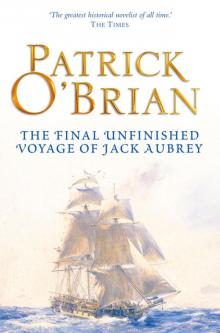 The Final Unfinished Voyage of Jack Aubrey
The Final Unfinished Voyage of Jack Aubrey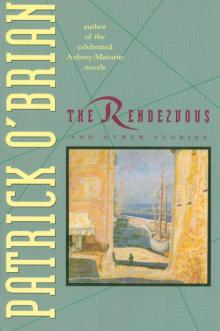 The Rendezvous and Other Stories
The Rendezvous and Other Stories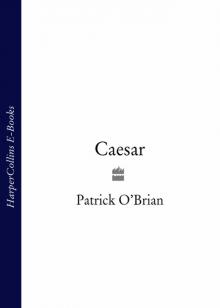 Caesar: The Life Story of a Panda-Leopard
Caesar: The Life Story of a Panda-Leopard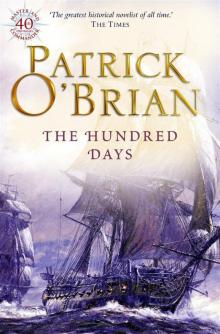 The Hundred Days
The Hundred Days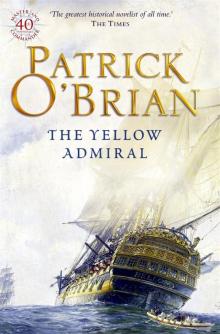 The Yellow Admiral
The Yellow Admiral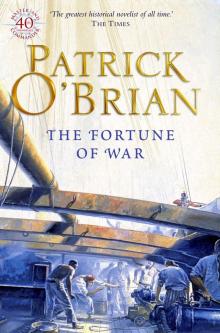 The Fortune of War
The Fortune of War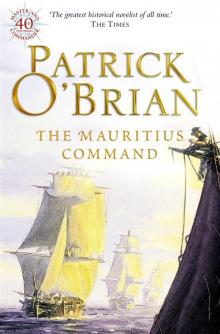 The Mauritius Command
The Mauritius Command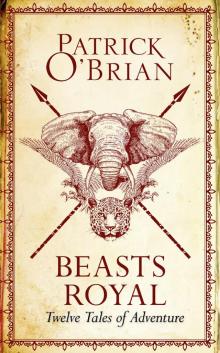 Beasts Royal: Twelve Tales of Adventure
Beasts Royal: Twelve Tales of Adventure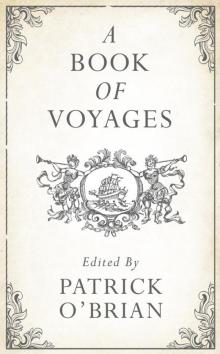 A Book of Voyages
A Book of Voyages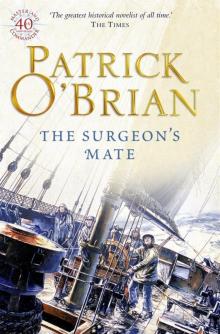 The Surgeon's Mate
The Surgeon's Mate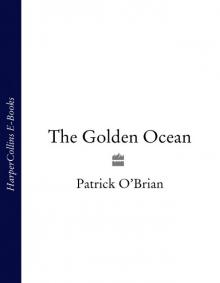 The Golden Ocean
The Golden Ocean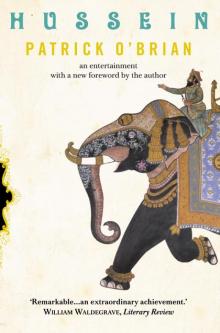 Hussein: An Entertainment
Hussein: An Entertainment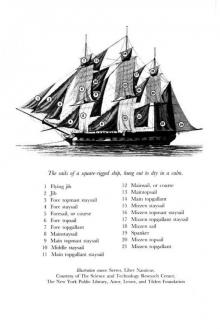 H.M.S. Surprise
H.M.S. Surprise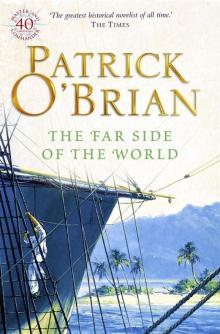 The Far Side of the World
The Far Side of the World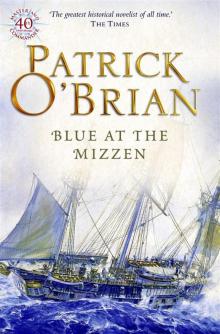 Blue at the Mizzen
Blue at the Mizzen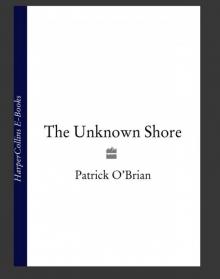 The Unknown Shore
The Unknown Shore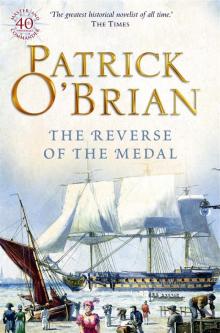 The Reverse of the Medal
The Reverse of the Medal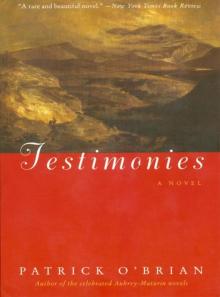 Testimonies
Testimonies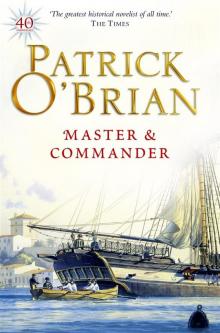 Master and Commander
Master and Commander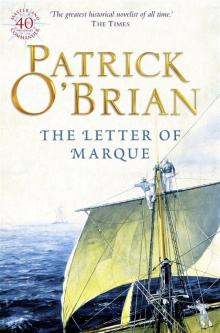 The Letter of Marque
The Letter of Marque Treason's Harbour
Treason's Harbour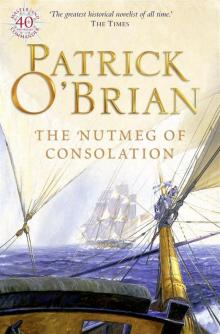 The Nutmeg of Consolation
The Nutmeg of Consolation 21: The Final Unfinished Voyage of Jack Aubrey
21: The Final Unfinished Voyage of Jack Aubrey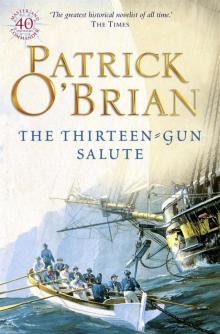 The Thirteen-Gun Salute
The Thirteen-Gun Salute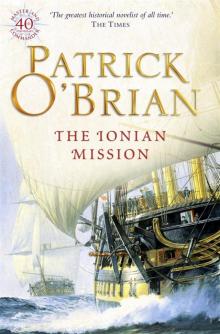 The Ionian Mission
The Ionian Mission Men-of-War
Men-of-War The Commodore
The Commodore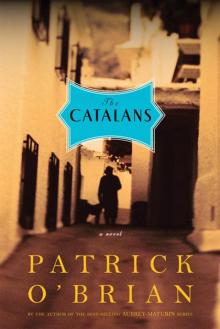 The Catalans
The Catalans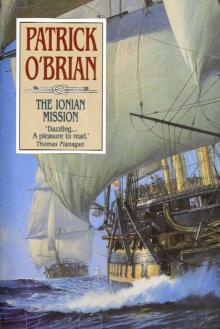 Aub-Mat 08 - The Ionian Mission
Aub-Mat 08 - The Ionian Mission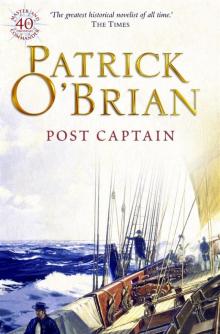 Post Captain
Post Captain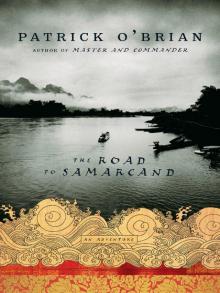 The Road to Samarcand
The Road to Samarcand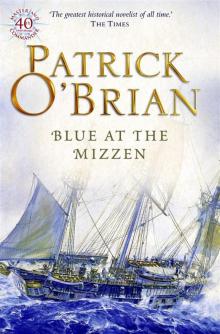 Book 20 - Blue At The Mizzen
Book 20 - Blue At The Mizzen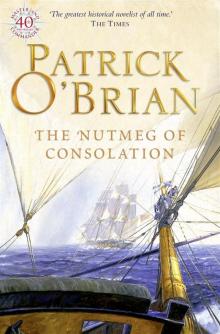 Book 14 - The Nutmeg Of Consolation
Book 14 - The Nutmeg Of Consolation Caesar
Caesar The Wine-Dark Sea
The Wine-Dark Sea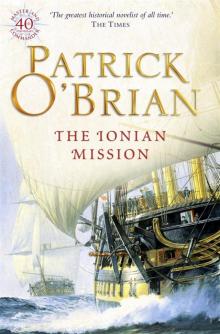 Book 8 - The Ionian Mission
Book 8 - The Ionian Mission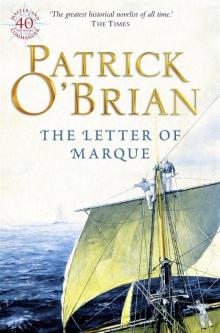 Book 12 - The Letter of Marque
Book 12 - The Letter of Marque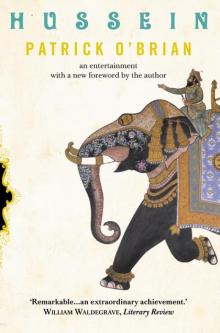 Hussein
Hussein Book 9 - Treason's Harbour
Book 9 - Treason's Harbour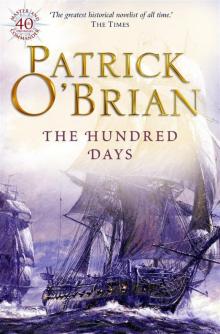 Book 19 - The Hundred Days
Book 19 - The Hundred Days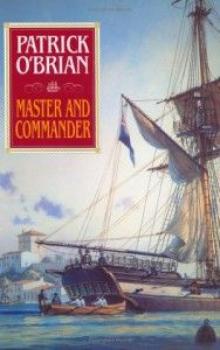 Master & Commander a-1
Master & Commander a-1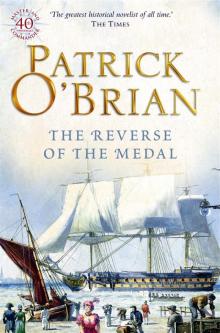 Book 11 - The Reverse Of The Medal
Book 11 - The Reverse Of The Medal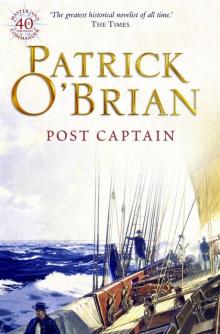 Book 2 - Post Captain
Book 2 - Post Captain The Truelove
The Truelove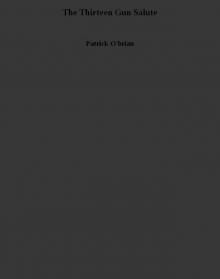 The Thirteen Gun Salute
The Thirteen Gun Salute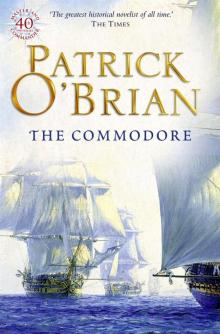 Book 17 - The Commodore
Book 17 - The Commodore The Final, Unfinished Voyage of Jack Aubrey
The Final, Unfinished Voyage of Jack Aubrey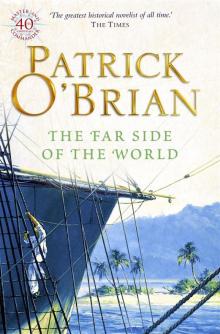 Book 10 - The Far Side Of The World
Book 10 - The Far Side Of The World Book 5 - Desolation Island
Book 5 - Desolation Island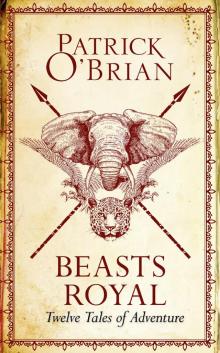 Beasts Royal
Beasts Royal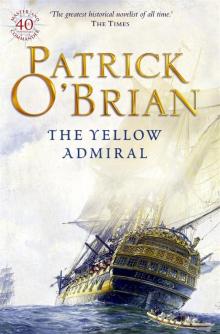 Book 18 - The Yellow Admiral
Book 18 - The Yellow Admiral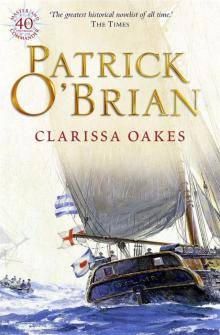 Book 15 - Clarissa Oakes
Book 15 - Clarissa Oakes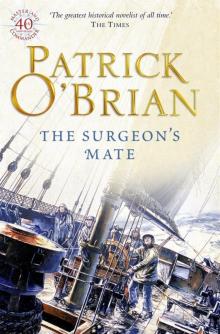 Book 7 - The Surgeon's Mate
Book 7 - The Surgeon's Mate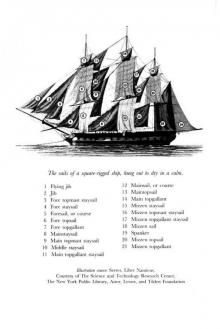 Book 3 - H.M.S. Surprise
Book 3 - H.M.S. Surprise Desolation island
Desolation island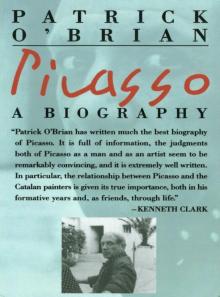 Picasso: A Biography
Picasso: A Biography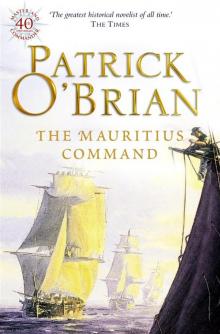 Book 4 - The Mauritius Command
Book 4 - The Mauritius Command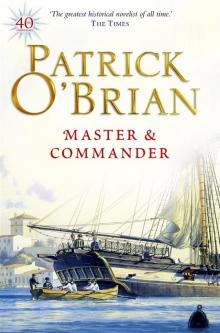 Book 1 - Master & Commander
Book 1 - Master & Commander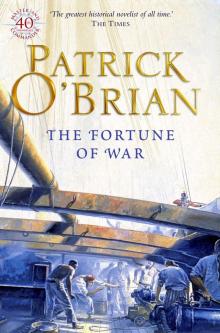 Book 6 - The Fortune Of War
Book 6 - The Fortune Of War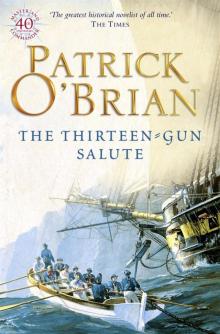 Book 13 - The Thirteen-Gun Salute
Book 13 - The Thirteen-Gun Salute Book 16 - The Wine-Dark Sea
Book 16 - The Wine-Dark Sea